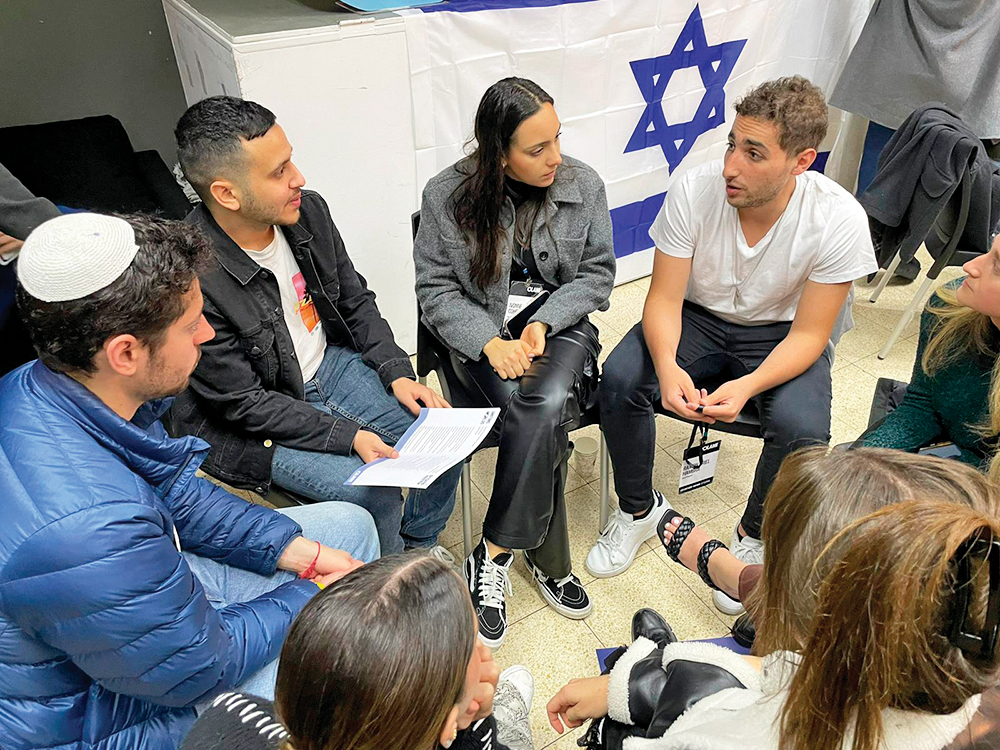
The war against Israel isn’t just in the Middle East; it’s become a worldwide battle, and college campuses are a flashpoint in this fight. Students are a prime target in this new battlefield. Going beyond politics or criticism of Israel, the fight has morphed into hatred, with Jewish students being targeted simply for being Jewish, threatened both physically and verbally at violent on-campus protests and on social media.
Much work is needed to transform campuses into places with zero tolerance for antisemitism, and one critical tactic is trips to Israel for university students and young professionals.
While many organizations have focused on bringing delegations of donors and policymakers to Israel since Oct. 7, Olami is actively sponsoring solidarity trips for young Jewish adults. These missions aim to provide firsthand experiences of the ongoing war, impart a comprehensive understanding of Israel’s history, and forge personal connections with Israelis. This knowledge equips participants to combat antisemitism, giving them the ground-up perspective they need to fight antisemitism on campuses and in their communities. Their experience strengthens and empowers them to defend Israel and Judaism by refuting the lies, misinformation and hatred that is rampant on and around college campuses.
One reason for the success of student solidarity missions is the sense of unity and connection they foster. Jewish students and recent graduates from a wide variety of backgrounds—from different communities, different parts of the world, different levels of observance—come together for what turns into a life-changing event for many of them. Program participants visit the historic holy places—the Western Wall, Jerusalem’s Old City, Masada and many more—as well as the institutions of modern-day Israel, like the Knesset, the Supreme Court and more. And they get to meet Israelis, at work and at play—from the biggest hi-tech companies to the country’s famous beaches and markets.
Such experiences, even in ordinary times, build a sense of confidence in one’s Jewish identity and the role Israel plays in it. During times like these, visiting Israel and meeting its people, including the relatives of fallen soldiers, survivors of the Oct. 7 massacres and those who remain evacuated from their homes near the borders, is even more meaningful, recent participants said.
“As a Jewish person in America, I felt the need to go to Israel as soon as possible after October 7,” said Elijah Feldman, an undergraduate student at The University of California, Berkeley, who recently visited Israel on an Olami trip. “Preparing food for soldiers, meeting with injured soldiers, and playing with evacuated kids, all felt so incredible. I felt that I was able in the little way I could, to help my people and the people in my homeland.”
Such trips also provide a source of strength. Hearing Israelis’ stories of perseverance provides students with the inspiration and motivation to continue important activities that fight antisemitism and combat lies on campuses.
“Israelis my age are on the front lines,” said Phillip Yurchenko from Manhattan, who went on a recent Olami trip to Israel, and participates in Olami programs in New York for young professionals. “They are defending the State of Israel and they are defending the rights of Jews around the world. They are sending a message to the world that one cannot attack Jews and get away with it. While they are doing important work in the Land of Israel, we need to do important work in our communities to defend and strengthen the Jewish People.”
Throughout it all, visiting students also learn the true story of Israel—how its people desire nothing more than to live in peace, in security and safety. More specifically, especially today, visiting students can witness for themselves the threats that Israelis face daily, despite their desire and efforts to live in peace. Touring the destruction of the communities near Gaza that were attacked on Oct. 7, listening to the accounts of first responders, and even seeing the signs for bomb shelters in public places offers tangible and ongoing proof of the human suffering that terrorism causes. Students post about these experiences on social media to raise awareness among their peers, but equally important, they take these photos and stories home with them in order to be better equipped to talk to others about the very real threat of terrorism Israelis face everyday.
“During my trip, I understood that we must all come together and do our part to strengthen world Jewry,” Yurchenko said. “Seeing Israelis my age defending the Jewish people inspired me to strengthen my Jewish identity through learning and Israel advocacy.”
The fall of 2023 was the most antisemitic semester on college campuses in American history. Solidarity missions focus on turning students into non-uniformed soldiers, driving home the message that their ground-up influence is essential for victory. By equipping students with firsthand knowledge, personal connections, and a deep sense of responsibility, such missions will help shape a generation of people to stand up against antisemitism and anti-Israel activity on the front lines of social media and college campuses.
Rabbi David Markowitz is the executive vice president and managing director of Vision And Partnerships at Olami.












